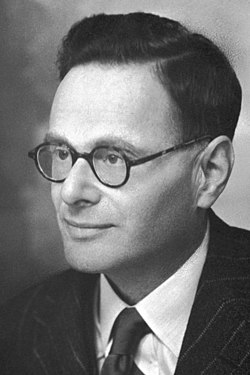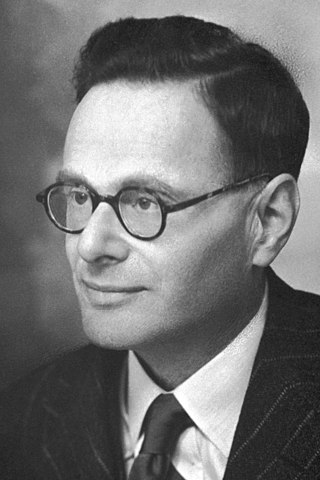Hans Krebs
German-British biochemist (1900-1981) From Wikipedia, the free encyclopedia
Sir Hans Adolf Krebs (German pronunciation: [ˈhans ˈaːdɔlf ˈkʁeːps] (![]() listen), /krɛbz, krɛps/; 25 August 1900 – 22 November 1981)[1][2][3][4] was a German Jewish scientist who became a naturalised British citizen. He was a physician and biochemist.[5]
listen), /krɛbz, krɛps/; 25 August 1900 – 22 November 1981)[1][2][3][4] was a German Jewish scientist who became a naturalised British citizen. He was a physician and biochemist.[5]
Hans Krebs | |
|---|---|
 | |
| Born | 25 August 1900 |
| Died | 22 November 1981 (aged 81) |
| Nationality | German, British |
| Alma mater | University of Göttingen University of Freiburg University of Berlin University of Hamburg |
| Known for | Discovery of the urea cycle and the citric acid cycle |
| Awards | Nobel Prize in Physiology or Medicine (1953) |
| Scientific career | |
| Fields | Internal medicine, biochemistry |
| Institutions | Kaiser Wilhelm Institute for Biology University of Hamburg Cambridge University University of Sheffield University of Oxford |
Krebs researched metabolism. He is famous because he discovered the urea cycle and the citric acid cycle (also called the Krebs Cycle). Krebs won the Nobel Prize in Physiology or Medicine for this, in 1953.[6]
Early years
Krebs was born in Hildesheim, Germany. His mother was Alma Davidson. His father was Georg Krebs. Georg Krebs was an ear, nose, and throat doctor.
Education
Krebs studied medicine at the University of Göttingen and the University of Freiburg from 1918–1923. He earned his Ph.D. at the University of Hamburg in 1925. Next, he studied chemistry in Berlin for one year. In Berlin, he helped Otto Warburg at the Kaiser Wilhelm Institute for Biology until 1930.
Career
Krebs worked as a doctor in the Altona hospital and at the University of Freiburg. At the University of Freiburg he researched the urea cycle.
Because he was Jewish, Krebs could not be a doctor in Germany. In 1933 he moved to England. He worked at Cambridge with Sir Frederick Gowland Hopkins. In Cambridge he researched biochemistry. In 1945 he became a Professor (teacher) at the University of Sheffield.
In 1954 he became a professor in Oxford. After his retirement, Krebs continued work at the Radcliffe Infirmary until his death. He was a fellow of Trinity College in Oxford.
Honors
In 1953 Krebs received the Nobel Prize in Physiology for his "discovery of the citric acid cycle".[7] He was knighted in 1958.
Krebs was elected Honorary Fellow of Girton College, Cambridge University in 1979.
Personal life
In 1938, Krebs married Margaret Cicely Fieldhouse. They had three children: two boys and a girl: John, Paul and Helen. His son John Krebs was an ornithologist and member of the House of Lords.
Timeline
- 1900 Born in Germany
- 1918 Began medical school
- 1923 Graduated from medical school
- 1925 Graduated with Ph.D. from University of Hamburg
- 1932 Identification of Urea cycle
- 1933 Moved to the United Kingdom
- 1937 Identification of Citric acid cycle or "Krebs cycle"
- 1945 Became a Professor at University of Sheffield
- 1953 Won the Nobel Prize
- 1958 Knighted
- 1981 Died in Oxford, England
References
Wikiwand - on
Seamless Wikipedia browsing. On steroids.
